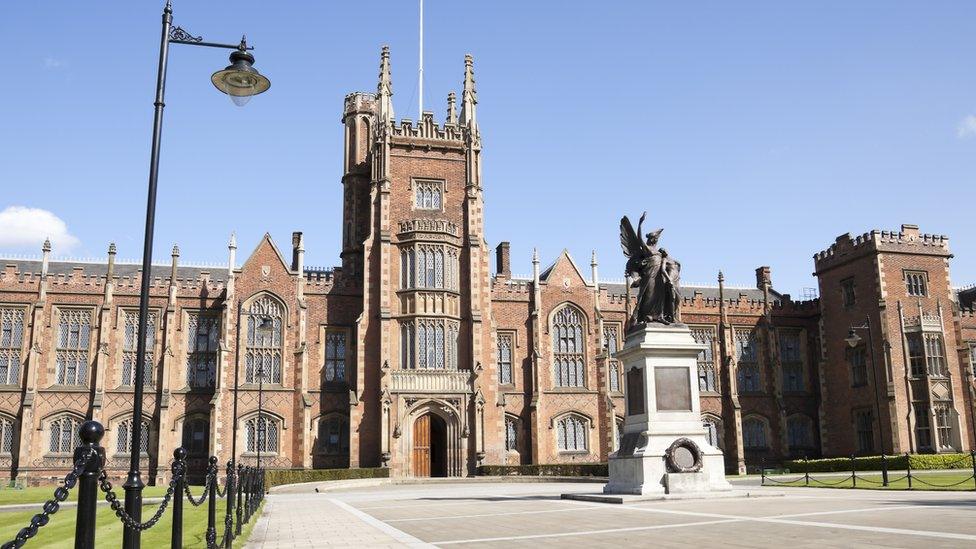University tuition fees: Higher fees and cutting NI places considered to save money
- Published
- comments

The Department for the Economy (DfE) has modelled cutting university places and increasing tuition fees by almost 60% to save money.
That is according to a presentation given to Stormont's Economy Committee.
Ending Educational Maintenance Allowance (EMA) - which helps 16-19 year olds from low income backgrounds- has also been considered.
The DfE presentation, seen by BBC News NI, said the department was facing budget cuts.
It also faces the loss of £65m in EU funding.
Finance Minister Conor Murphy has previously warned that the 2022-25 budget would see some departments facing "significant challenges."
The Stormont draft budget is proposing a 10% increase in health funding, but a squeeze on other departments.
One of DfE's main responsibilities is the funding of further and higher education.
The department's annual resource budget - for day-to-day spending - is just over £800m.
Almost three-quarters of that budget is spent on education and skills including funding universities, student finance, further education colleges and apprenticeships.
But the presentation said the department could face a 2% annual cut in its baseline budget and the loss of £65m of EU funding each year, which the committee was told would leave a "huge hole" in DfE's core business.

The department modelled reducing funding for apprenticeships by half and ending Educational Maintenance Allowance
The EU's structural funds have been replaced by the UK's Shared Prosperity Fund, but Mr Murphy has previously claimed Northern Ireland would lose out due to the change.
The DfE presentation details the options it has modelled for saving money from 2022-2025.
It estimates the department may need to generate savings of about £250m during that period.
The department's presentation said it could save £30m a year by cutting the number of student places it funds at Northern Ireland's universities.
Northern Irish students who study at local universities currently pay £4,530 a year in tuition fees.
But DfE calculated that raising these fees by 59% from September 2024 - to about £7,200 a year - would save £63m.
'Not concrete proposals'
EMA is paid to 16-19 from low income backgrounds who continue in full-time education.
They receive £30 a week towards the cost of travel, books and other equipment for their courses.
But DfE estimated that ending EMA would save £15m a year.
According to the presentation, cutting all other student grants could save £51m a year, while the department has also modelled reducing funding for apprenticeships by half.
The saving proposals are described in the presentation document as "modelled options" so are not concrete proposals.
But the presentation warned that without adequate funding for DfE "many businesses and the livelihoods of families across Northern Ireland will be materially worse off".
It said "structural weaknesses in skills and education" would increase and there would be "huge financial stress" on universities.
The presentation also warned that "life outcomes for young people will change dramatically" as a result.
The DfE presentation also said that investment in education and skills had "fallen significantly" over the past decade, and that there had been a 14% reduction in public spending on education as a whole in Northern Ireland since 2010-11.
Previous research published by the Institute for Fiscal Studies has also suggested that Northern Ireland had faced the highest school spending cuts per pupil in the UK over the past decade.
Related topics
- Published18 October 2021

- Published19 January 2020

- Published14 December 2021

- Published29 April 2020
